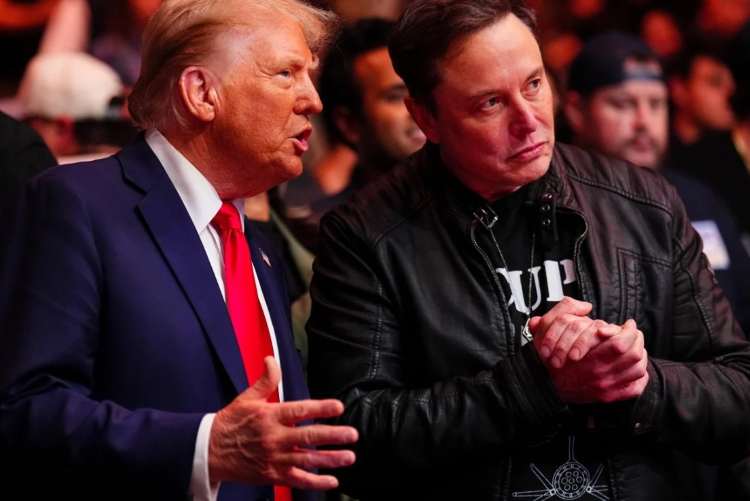
Trump-Musk feud: For eighteen turbulent months, the world’s most powerful politician and its wealthiest businessman proclaimed an alliance made in capitalist heaven. Elon Musk bankrolled Donald Trump’s 2024 campaign—nearly $300 million—and accepted a Cabinet-rank post to prune Washington’s budgets. Mr Trump replied with devout favours: fat tax credits for Tesla, billion-dollar contracts for SpaceX, and a photo-op in a Model Y on the South Lawn.
On 5 June, prime-time viewers watched the romance curdle. Mr Trump, angered by Mr Musk’s attack on his One Big Beautiful Bill, vowed to scrap every federal subsidy and contract linked to Musk’s empire. Tesla lost 14% —or $150 billion—in a single session. The billionaire struck back on X, endorsing impeachment calls and hinting darkly at Epstein files. The duel was pure theatre; the warning to markets and to democracy was deadly serious.
READ I Small car sales crash reveals middle class squeeze
Why politicians court billionaires
Modern elections are ruinously expensive. A Brookings study shows that the richest 0.01 per cent supplied more than 40% of all US campaign money in 2024. When money speaks at that volume, access and regulation become bargaining chips.
India is hardly immune. In 2023-24, two-thirds of all declared donations reached parties through opaque electoral bonds, most of them purchased by large corporations. If funding hides in the shadows, policy soon follows.
Price of Trump-Musk feud
The Trump–Musk fracas shows how public money can be reduced to a private hostage. SpaceX’s Dragon capsule is NASA’s only ticket to the International Space Station, yet its future was momentarily at the mercy of a Twitter tirade. Decisions of national import swung on personal pique, not public interest.

When a single conglomerate’s valuation can rattle both the stock index and the exchequer—as Adani’s did after the 2023 Hindenburg report—the danger is not merely corporate; it is systemic. Tesla’s $150 billion plunge shaved 0.3 percentage points off the S&P 500 that day, proof that valuations tethered to political favour lose their anchor in fundamentals.
Regulatory capture—and how others resist it
Unchecked lobbying and revolving doors, the OECD warned last year, “tilt outcomes toward the well-connected.” Mr Musk’s pivot from White House insider to its fiercest critic is textbook; his tenure had already diluted emission norms and extended satellite-spectrum leases.
Canada offers a sturdier model: every lobbyist must register in a public database and log ministerial contacts within ten days, on pain of stiff fines. Germany’s Lobbyregistergesetz, born of the “mask-gate” scandal, forces lawmakers to publish outside income above €1,000. Sunshine disinfects: Kiel Institute studies show no procurement advantage once those disclosures go online.
Australia adds another layer. Corporate donations are capped at A$16,300 a year, and ministers face an 18-month cooling-off period before courting the industries they once regulated. Compare that to Washington’s revolving door—or the Indian trend of appointing retired secretaries as corporate “advisors”—and the urgency of such guard-rails becomes self-evident.
Voters are not naïve. A March Pew poll found 71% of Americans convinced that billionaires wield excessive clout. Indian opposition leaders trade daily on similar resentment. When citizens believe policy is auctioned, they lose faith first in reform, then in the republic itself.
Five correctives for India
- Enact a Lobbying Transparency Act—mandatory registers, cooling-off periods, real-time disclosure.
- Retire electoral bonds; replace them with modest, audited state funding linked to vote share.
- An arm’s-length commission, not the executive, should select boards of SEBI, CCI and other regulators.
- Any firm crossing 25 per cent of central contracts in a strategic sector must face a compulsory open review.
- Free press, cheaper insurance. Reform defamation laws; shield investigative reporters from ruinous lawsuits.
A constitutional reminder
Article 14 of the Indian Constitution promises equality before the law; Article 19 protects the citizen’s right to question authority. Neither provision foresaw a world in which an individual fortune could outstrip the GDP of 130 nations. When money sits too close to power, both principles bend.
The Trump–Musk melodrama is America’s headache today, but its echo reaches every democracy. We can dismiss it as circus or treat it as an early-warning siren. If we wish the republic to remain, in Lincoln’s words, a government of the people, we must erect walls high enough to keep private wealth out of the pilot’s seat—before the next tantrum at the top crashes both markets and faith in self-government.
